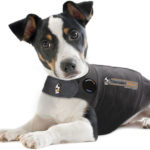Fighting Noise Phobia on 4th of July
The fourth of July is this week, and for most of us that means cookouts, fireworks and fun. For owners of dogs that suffer from noise phobia, this particular holiday can be an absolute nightmare. Fireworks and other loud noises such as thunderstorms can cause panic in affected dogs. My parents had a Jack Russell terrier (she passed at the age of 20) that used to tremble, pant, and hide under the toilet at the mere thought of an approaching storm. Once the thunder was cracking or the fireworks were bursting she was inconsolable and destroyed many a door, baseboard, crate or any other item that she turned her attention to during her state of terror.
If you have experienced this to any degree with your own dog, don’t despair. There are steps you can take to help ease their fear and calm them down. You want to be sure and start treating any anxiety as soon as you notice the signs, as it will only get worse with time.
Create a safe space for your dog to weather the storm. Some dogs will pick a place and if this is the case just leave them there; don’t force them into an alternative space that you choose. You can offer them toys stuffed with tasty treats to help get their mind off the noise and hopefully start to create a positive association.
Adaptil is a synthetic compound that mimics a pheromone that lactating mother dogs give off and this compound has been clinically shown to reduce anxiety. Adaptil comes in a spray that can be applied to blankets or a neck bandanna for intermittent use. Alternatively it comes as a collar that emits the pheromone continuously for a month. 
The Thundershirt is another option and I have clients that swear by it. It works by applying constant gentle pressure that is thought to clam anxiety. This is the same idea as swaddling babies or Dr. Temple Grandin’s development of the “Hug Machine” for helping people with Autism.
Finally, medication should be considered and discussed with your veterinarian. It is best to not wait until the phobia progresses but to intervene early and hopefully prevent development of worsening anxiety. A sedative called acepromazine has long been used for noise phobia, but it is no longer the drug of choice and can actually make things worse. With this particular medication the dog is sedate which may hide many signs of anxiety. The problem is that they are still anxious; they’re just too knocked out to do anything about it. The preferred medication will target anxiety directly to help address and hopefully eliminate the underlying problem.
I hope these tips help to make for a happy Fourth of July celebration for you and your dog!
 Dr. Ashley Gallagher graduated from the University of Florida College of Veterinary Medicine and completed an internship at Friendship. She’s been on staff ever since and works on both our primary care and surgery services. Dr. Gallagher has her hands full at home with four dogs and three cats, who always keep things interesting.
Dr. Ashley Gallagher graduated from the University of Florida College of Veterinary Medicine and completed an internship at Friendship. She’s been on staff ever since and works on both our primary care and surgery services. Dr. Gallagher has her hands full at home with four dogs and three cats, who always keep things interesting.
* Featured image courtesy of Purple Box Jewelry.
